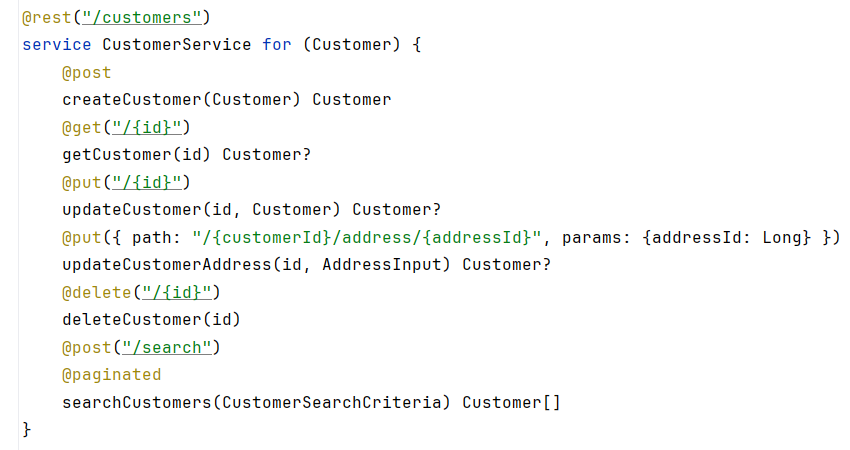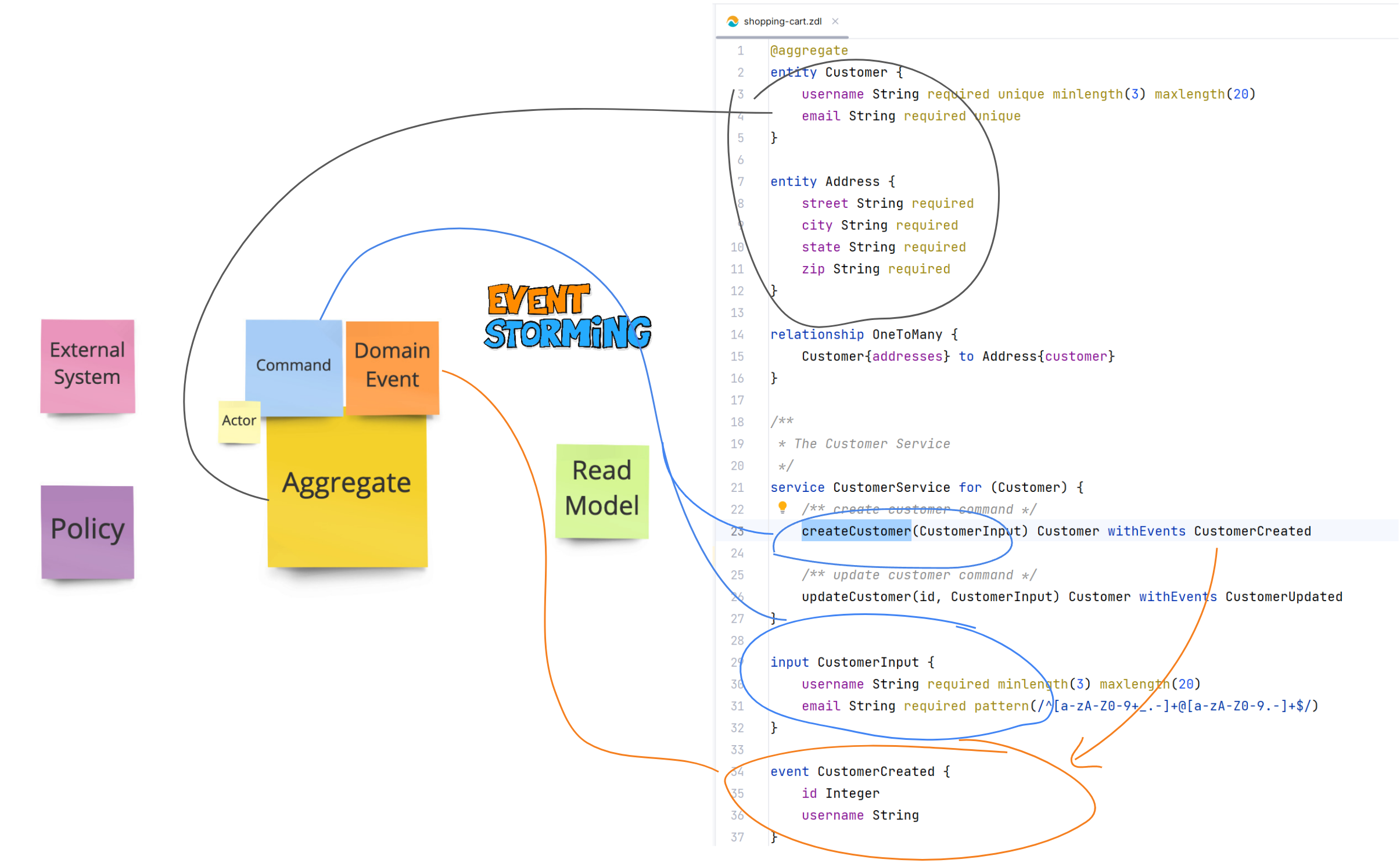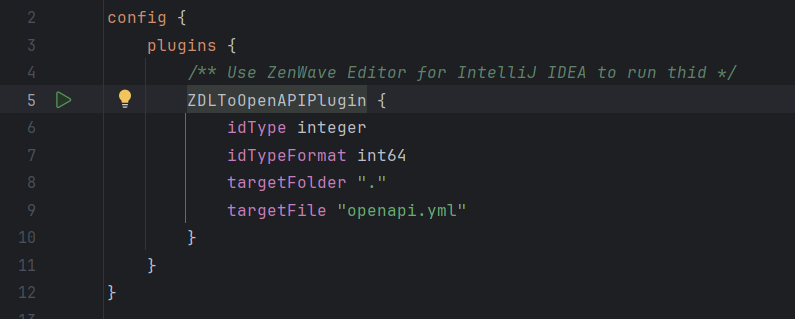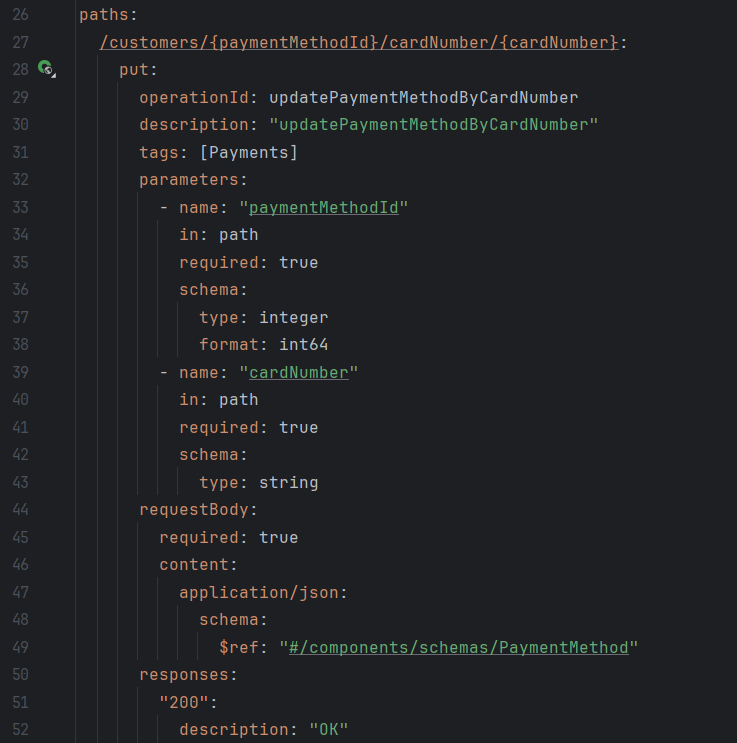This article was first published @medium: Stop writing YAML for OpenAPI, use a compact DSL and save time and typing.
Generating OpenAPI definition files from "ZenWave Domain Language" models with ZenWaveSDK
Because writing YAML by hand is now fun...
You can use ZenWave Domain Language models as IDL to generate OpenAPI v3 with ZenWave SDK.
Imagine being able to quickly define an API in a more concise and readable way, without losing the rigor of an OpenAPI specification. This article explores how you can leverage ZenWave Domain Language (ZDL), a compact developer-friendly DSL, to generate OpenAPI definitions, simplifying the process of creating API documentation, reducing errors, and improving developer productivity. Whether you're managing an extensive API or just getting started, a DSL might be the key to making your API workflow more efficient.
This is how it looks ZenWave ZDL as OpenAPI IDL (fragment):

ZenWave Domain Language (ZDL)
Inspired by JHipster JDL, ZDL is a language for describing DDD Bounded Contexts, including domain entities and their relationships, services, commands, events and business policies... for Event-Driven Architectures.
It's designed to be compact, readable and expressive. Developer friendly, and machine friendly. It works well as an Ubiquitous Language format.
It can also be used as an IDL for authoring OpenAPI (and AsyncAPI) definition files.

Creating a ZDL for authoring an OpenAPI definition
- As a minimum requirement, you need a
serviceand anaggregate entityfor this service. - You can use this
entityas request and response objects or you can define separate DTOs for this purpose usinginputandoutputentities. - You can also define and reference
enumsandrelationshipsbetween entities. Nested entities and arrays also work. - Lastly you need to define the service methods and their parameters and annotate them using
@rest,@post,@get,@put,@delete,@paginated,@inlineannotations.
@aggregateentity PaymentMethod {type PaymentMethodType requiredcardNumber String required minlength(16) maxlength(16)}enum PaymentMethodType { VISA(1), MASTERCARD(2) }@rest("/payment-methods")service PaymentsService for (PaymentMethod) {@postdoSomethingWithANewPayment(PaymentMethod) PaymentMethod@put("/{id}")doSomethingWithAnExistingPayment(id, PaymentMethod) PaymentMethod?}
NOTE: service method only accept two kind of parameters: id and command payload (that will map to the request body), but you can use @inline to expand fields as request path parameters (see below).
Checkout the ZDL documentation for more details about command methods.
Install ZenWave SDK Using JBang
Install an evergreen self updating ZenWave SDK CLI using JBang:
jbang alias add --force --fresh --name=zw release@zenwave360/zenwave-sdk
Following these instructions for complete details about JBang and IntelliJ Editor: https://www.zenwave360.io/docs/getting-started/
Now you can use jbang zw to generate a complete OpenAPI definition file from your ZDL model.
jbang zw -p ZDLToOpenAPIPlugin \zdlFile=model.zdl \idType=integer \idTypeFormat=int64 \targetFolder=. \targetFile=payments-openapi.yml
Or use ZenWave ZDL Editor for IntelliJ configuring the generator plugin on top of your zdl file:
config {plugins {/** Use ZenWave Editor for IntelliJ IDEA to run this */ZDLToOpenAPIPlugin {idType integeridTypeFormat int64targetFolder "."targetFile "openapi.yml"}}}

Then, check the generated OpenAPI definition file payments-openapi.yml, and see for yourself how much typing you saved!
Expanding fields as request path parameters
You can use @inline ìnputs to expand fields as request path parameters (and service method parameters).
@inline // expand fields as request parametersinput PaymentMethodInput {cardNumber StringpaymentMethod PaymentMethod}@rest("/customers")service PaymentsService for (PaymentMethod) {@put("/{paymentMethodId}/cardNumber/{cardNumber}") // see example below to specify param typesupdatePaymentMethodByCardNumber(PaymentMethodInput) PaymentMethod?}
It will pick the first parameter from the entity id and the remaining parameters will be configured as string

But you can override the path params with configuration, see complete example below.
Complete ZDL Example
@aggregateentity Customer {name String required maxlength(254) /** Customer name */email String required maxlength(254) pattern(/^[a-zA-Z0-9._%+-]+@[a-zA-Z0-9.-]+\.[a-zA-Z]{2,4}$/)/** Customer Addresses can be stored in a JSON column in the database. */@json addresses Address[] minlength(1) maxlength(5) {street String required maxlength(254)city String required maxlength(254)}}entity PaymentMethod {type PaymentMethodType requiredcardNumber String required}enum PaymentMethodType { VISA(1), MASTERCARD(2) }relationship OneToMany {Customer{paymentMethods required maxlength(3)} to PaymentMethod{customer required}}// you can create 'inputs' as dtos for your service methods, or use entities directlyinput CustomerSearchCriteria {name Stringemail Stringcity Stringstate String}@inline // expand fields as request parameters (and service method parameters)input AddressInput {addressId Stringaddress Address}@rest("/customers")service CustomerService for (Customer) {@postcreateCustomer(Customer) Customer@get("/{id}")getCustomer(id) Customer?@put("/{id}")updateCustomer(id, Customer) Customer?@put({ path: "/{customerId}/address/{addressId}", params: {addressId: Long} }) // specify param typesupdateCustomerAddress(id, AddressInput) Customer?@delete("/{id}")deleteCustomer(id)@post("/search")@paginatedsearchCustomers(CustomerSearchCriteria) Customer[]}
Run:
jbang zw -p io.zenwave360.sdk.plugins.ZDLToOpenAPIPlugin \zdlFile=customers-model.zdl \idType=integer \idTypeFormat=int64 \targetFolder=. \targetFile=openapi.yml
And get surprised by the amount of YAML typing you saved!
Happy coding! 🚀